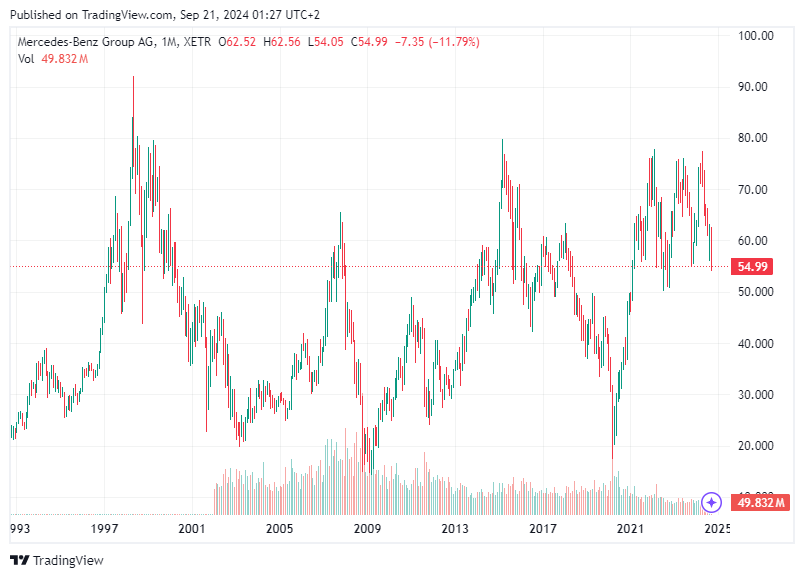Mercedes-Benz Reduces Full-Year Outlook
Mercedes-Benz Lowers Full-Year Outlook: Navigating Economic Headwinds.

Disclaimer: This article is for informational purposes only and should not be considered as financial or investment advice. The views expressed herein are based on the information available at the time of writing and are subject to change.
Mercedes-Benz has announced a downward revision of its full-year profit outlook. This decision comes amid growing economic challenges, most notably in China, which is a crucial market for the German automaker.
The Economic Context
The global economy is currently in a state of flux, with various regions experiencing economic pressures. In China, which has been a powerhouse of global growth for decades, there are signs of slowing momentum. The Chinese economy is grappling with a range of issues, including a downturn in the real estate sector and weaker consumer spending. These factors have combined to create a challenging environment for businesses, particularly those in sectors reliant on high-end consumer goods.
For Mercedes-Benz, the Chinese market has historically been a major source of revenue. The luxury car segment, which includes models like the S-Class and Maybach sedans, has been particularly affected. The hesitancy among China's affluent buyers to make luxury purchases is a concern for the company. As a result, Mercedes-Benz has had to adjust its financial expectations. Mercedes-Benz has revised its profit forecast, projecting that earnings before interest and taxes (EBIT) will be lower than last year's figures. This adjustment reflects not only the challenges in China but also broader macroeconomic uncertainties. The company had previously forecasted a return of up to 11% for its main car division, but now expects this figure to fall between 7.5% and 8.5%.
Ola Kaellenius, the Chief Executive of Mercedes-Benz, has expressed caution regarding the outlook in China, acknowledging the complexities of the current economic landscape. This sentiment is shared by analysts, who were not entirely surprised by the revision but noted the severity of the forecast adjustment.
German Automakers
Mercedes-Benz is not alone in facing these challenges. The entire German automotive sector is experiencing a period of transition and uncertainty. Companies like BMW and Volkswagen are also grappling with reduced demand in China and the pressures of transitioning to electric vehicles (EVs).
The shift towards EVs represents a pivotal moment for the automotive industry. While it holds the promise of a more sustainable future, the transition involves significant investment and strategic adjustments. For German automakers, who have long been leaders in engineering and luxury, this shift requires a rethinking of product lines and market strategies. The transition to electric vehicles is a crucial aspect of the current challenges faced by Mercedes-Benz and other automakers. While the demand for electric vehicles is growing, the pace of adoption is uneven across different markets. In Europe, regulatory pressures are pushing for a rapid transition to EVs, with stringent CO2 emission targets set to tighten in the coming years. Failing to meet these targets could result in substantial fines, adding another layer of pressure for automakers.
However, in China, the situation is more complex. While the Chinese government has been promoting electric vehicles as part of its environmental policies, the economic slowdown has affected consumer spending, including on EVs. This dual challenge of meeting regulatory requirements while navigating economic headwinds complicates the strategic planning for companies like Mercedes-Benz.
The Industrial Crisis in Germany
The impact of these challenges extends beyond individual companies to the broader German industrial sector. Germany, known for its robust manufacturing base, is experiencing a deeper industrial crisis. The automotive industry, which is a cornerstone of the German economy, is particularly affected by the current economic and technological shifts.
The situation is further exacerbated by global supply chain issues, geopolitical tensions, and fluctuating commodity prices. These factors contribute to an environment of uncertainty, making it difficult for companies to plan and invest confidently. In response to these challenges, Mercedes-Benz and its peers are implementing various strategic measures. These include diversifying supply chains, investing in new technologies, and exploring new markets. Additionally, there is a focus on enhancing operational efficiencies to mitigate the impact of reduced demand and increased costs.
The outlook remains mixed. While the economic challenges in China and other key markets are expected to persist in the short term, there is optimism about the potential of new technologies and markets. The transition to electric vehicles, though challenging, offers opportunities for innovation and growth. The long-term success of Mercedes-Benz and other automakers will depend on their ability to navigate these challenges effectively. This will require a combination of strategic foresight, technological innovation, and adaptability to changing market conditions.
The decision by Mercedes-Benz to lower its full-year outlook highlights the complexities of operating in today's global economic environment. It serves as a reminder of the interconnectedness of markets and the need for companies to be agile in the face of change. As the automotive industry continues to evolve, the ability to adapt and innovate will be key to sustaining growth and maintaining competitiveness.
Disclaimer: The information provided in this article is based on current data and analysis. It is intended for informational purposes only and should not be taken as investment or financial advice. Always consult with a professional advisor before making any decisions based on this information.
We are working endlessly to provide free insights on the stock market every day, and greatly appreciate those who are paid members supporting the development of the Stock Region mobile application. Stock Region offers daily stock and option signals, watchlists, earnings reports, technical and fundamental analysis reports, virtual meetings, learning opportunities, analyst upgrades and downgrades, catalyst reports, in-person events, and access to our private network of investors for paid members as an addition to being an early investor in Stock Region. We recommend all readers to urgently activate their membership before reaching full member capacity (500) to be eligible for the upcoming revenue distribution program. Memberships now available at https://stockregion.net


